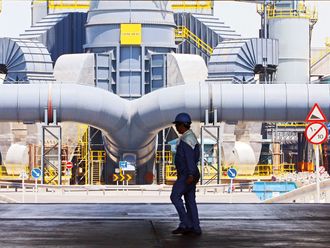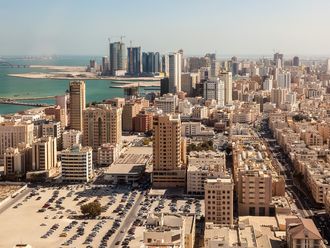Manama: Gulf countries are wary that an international struggle for geopolitical influence playing out in their neighbourhood could result in a new regional war, a think-tank leader has said.
“The leaders and peoples of the Gulf states worry when the problems of unfettered international competition in the region begin to exceed reasonable levels,” said Mohammad Abdul Gaffar, chairman of the board of trustees of the Bahrain Centre for Strategic, International and Energy Studies. “The levels are well-recognised in the disciplined competition usually conducted by regional and international actors and may eventually lead to calls for a new war in an area which has already suffered three devastating wars. Therefore such competition and conduct have become a source of anxiety and fear among the peoples of the region,” he said.
The situation in the Gulf can be represented by a strategic triangle with the Gulf Cooperation Council (GCC) states, Iran and the United States making for the three camps, Abdul Gaffar said. “Current events have significantly altered the regional and international balance of forces in the Gulf. The most significant of these developments are the outbreak of popular movements in some Arab countries, the mounting threat of Iranian armaments, the Iranian nuclear programme, and the global economic crisis,” he said, as he addressed a conference on conflict and competition in the Arabian Gulf attended by participants from Turkey, Europe and the US besides Arab countries.
“The tremendous transformations that swept the Middle East have played a significant role in changing some of the strategic triangle’s foundations. At a time when the US has maintained its pivotal military role in the Gulf and the world, it has seen this role recede in Iraq and it has been unable to play an active role in the Israeli-Palestinian peace process. At the same time, Iran has been able to maintain its regional geo-cultural networks by prying at regional sectarian fault lines in addition to diligently expanding its missile capabilities and extending the breadth of its land and naval armaments,” he said.
Abdul Gaffar attributed the GCC’s ascent within the triangle to its decision to collaboratively boost national economies and to significant developments in security and defence cooperation.
“In the past three decades, the GCC states have taken a strategic decision to focus much of their efforts on boosting the national economy, developing and reforming their political systems gradually in line with Gulf idiosyncrasies. The reforms have taken into account the political and social balance on the one hand, and the need to improve education and health services and administrative development on the other. The policy has yielded fruitful results in light of the current global economic crisis: in 2011, the GCC states achieved a real economic growth of 7.8 per cent, and the states’ combined total output was approximately $1.4 trillion [5.14 trillion],” he said.
“The second factor has been the significant development in security and defence cooperation. The GCC states have come a long way in strengthening military and security cooperation in accordance with the overall defence strategy adopted at the 2009 Kuwait summit. They promoted the concept of collective security by linking the air force operations centres, air defence, linking the armed forces via a unified communications network, improving air defence capabilities with a missile defence system, and by establishing a regional joint military maritime centre entrusted with various responsibilities relating to maritime security, the marine environment, freedom of maritime traffic, maritime rescue, disaster response, and all else relating to naval security in the Arabian Gulf.”
However, Abdul Gaffar noted that, despite their achievements in security and defence cooperation, the GCC states have not yet lived up to their people’s aspirations in addressing common threats. “Thus they find themselves urged to develop a comprehensive political, social and economic strategy to strengthen their security and stability,” he said.
Iran seeks recognition as a regional force able to maintain security in the Gulf and that it has opted for a non-cooperation strategy whereby it seeks concessions in exchange for its cooperation, he said. “The Iranians believe that the only way to achieve security is to manufacture conventional arms and develop nuclear technology, as well as to extend their influence in the Middle East through a variety of techniques,” he said.
“Iranian policymakers have retained the vision they adopted in and beyond 1979, consisting of chronic distrust toward regional powers and hostility toward the United States. This has made the Iranian regime captive to security concerns from which it have thus far failed to liberate itself, and embark on reconstructing a relationship based on trust with its neighbours. Iran persistently seeks to extend its sphere of influence in Lebanon, Yemen, Iraq and elsewhere.”
Abdul Gaffar maintained that Iran did do not “want to conform, even fleetingly, to the realities and requirements of regional and international politics”. The main objectives for the US regional military presence were the maintenance of security in the Gulf region as a component of its broader regional and international strategy, securing its own energy needs and those of its allies, protecting its regional allies, and maintaining the freedom of waterways in the Strait of Hormuz, he added.
“Undeniably the Gulf region will remain an arena for regional and international conflict and competition. This underscores the GCC states’ need to evaluate their strategic options for the management of this conflict. Certainly, promoting the concept of “strategic partnership” with the engaged international powers will have a significant impact upon attempts at realising common interests, notably at a time when the GCC states are looking to forge new partnerships in the world,” he said.
“Therefore, and in light of the current regional climate, all scenarios remain possible, pushing the GCC states to the identification of the strategic options that enable them to respond to any developments that may threaten the region’s security and stability,” Abdul Gaffar said.
Options include investing in diplomacy to highlight the GCC status as a reliable regional partner and agreeing upon on a common strategy to deal with the extremist groups that threaten their security and stability, he said.












